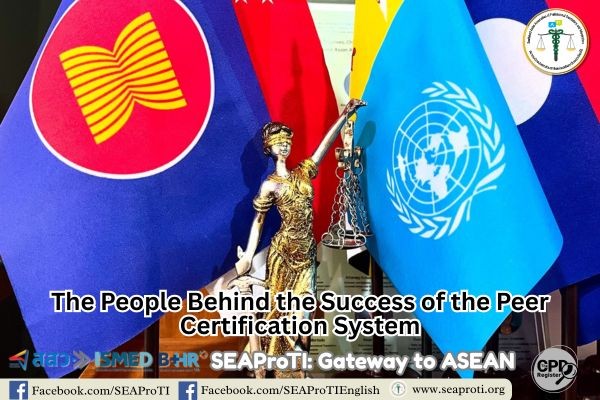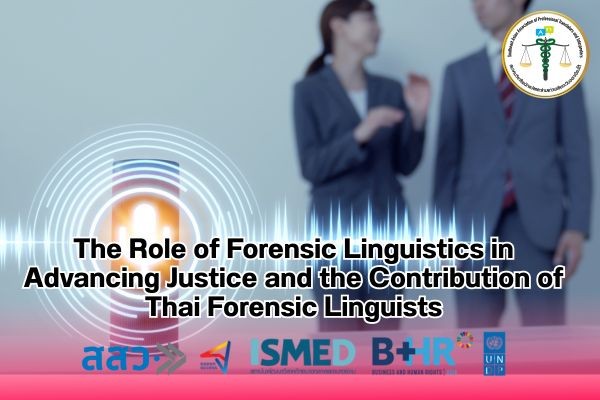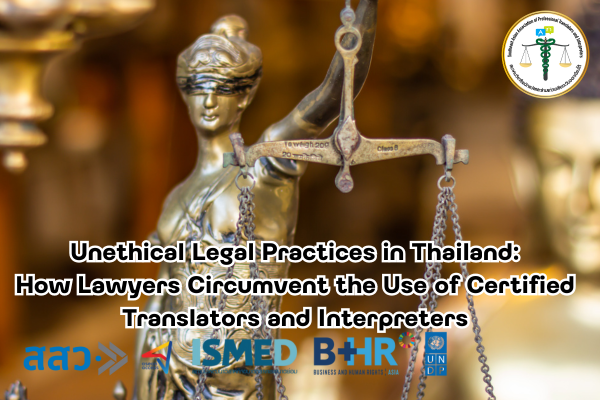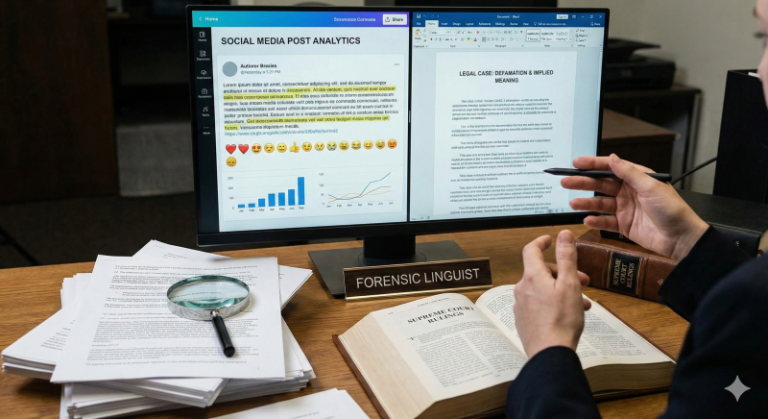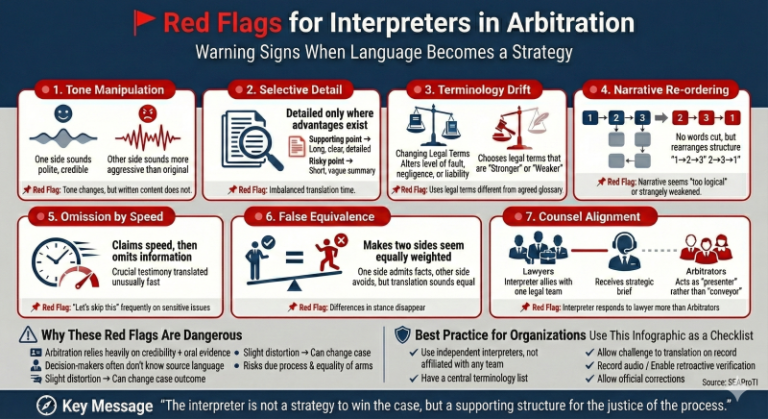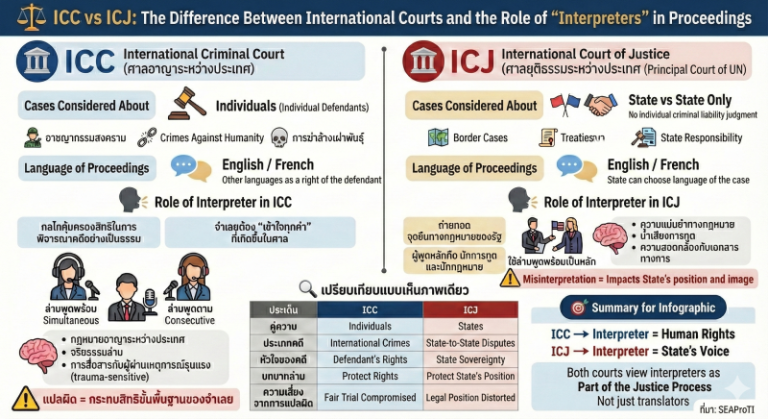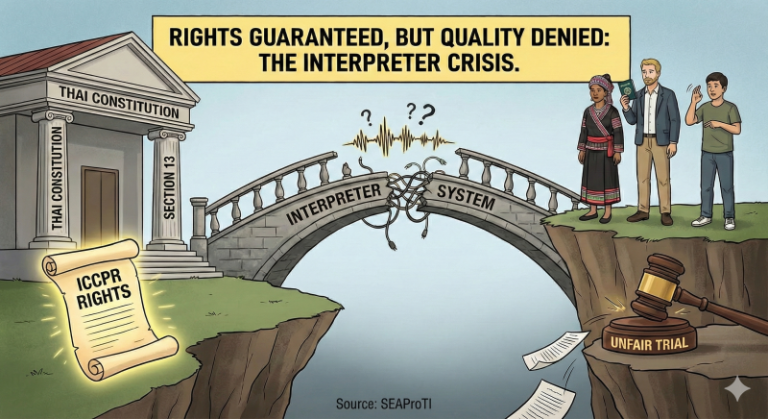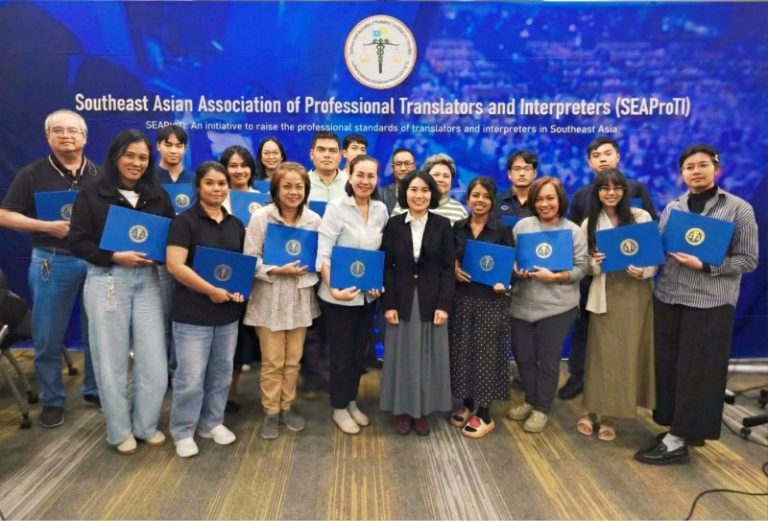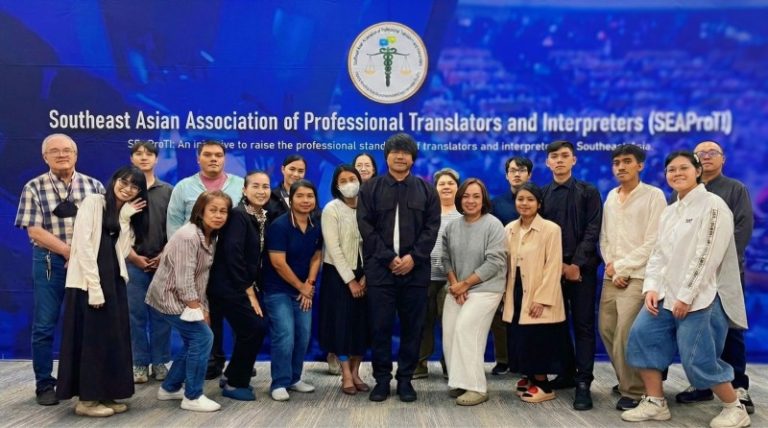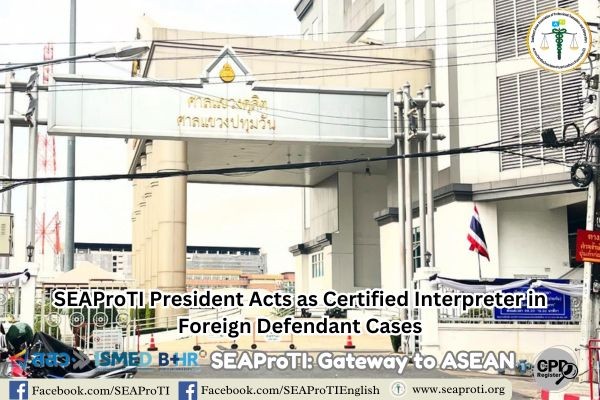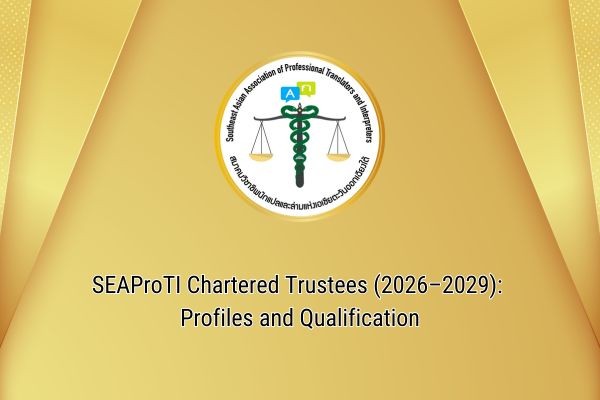The People Behind the Success of the Peer Certification System
14 October 2025, Bangkok – This article explores the pivotal roles and significance of individuals who grant certification within the Peer Certification System of the Southeast Asian Association of Professional Translators and Interpreters (SEAProTI). The system represents a crucial mechanism for elevating professional standards in translation and interpreting across the region. Certification by equally qualified peers is not limited to assessing linguistic competence—it also validates ethical integrity, impartiality, and professional credibility of practitioners in the field.
In an era where technology and artificial intelligence are increasingly shaping the landscape of translation and interpreting, the credibility of human professionals must be reaffirmed through transparent and peer-based validation systems. One such mechanism is the Peer Certification System, developed by SEAProTI to ensure the professional integrity and competence of translators and interpreters through recognition by qualified peers. This model follows international best practices adopted by professional bodies such as the International Association of Conference Interpreters (AIIC) and the Chartered Institute of Linguists (CIOL).
Components of the Peer Certification System
The success of the Peer Certification framework lies in the collective expertise of distinguished professionals who contribute to its credibility and fairness. These Peer Certifiers form a multidisciplinary group encompassing experts in law, mediation, arbitration, and language. They can be categorized into four principal groups as follows:
1. Judges
Judges with extensive experience in the Thai or international judiciary are responsible for evaluating the accuracy and legal validity of translated documents. Their role ensures that the language used aligns with legal principles and legislative intent.
Key Function: Guaranteeing Legal Accuracy and Semantic Completeness in legal translation.
2. Arbitrators
Arbitrators, specializing in international business and dispute resolution, assess translators and interpreters working in commercial and arbitration contexts. They ensure that practitioners demonstrate impartiality and a solid grasp of international legal and business discourse.
Key Function: Ensuring Neutrality and Contextual Understanding in international legal communication.
3. Mediators
Certified mediators, trained in negotiation and intercultural communication, evaluate interpreters’ interpersonal competence and ethical conduct. Their role emphasizes maintaining confidentiality, trust, and neutrality during mediation proceedings.
Key Function: Upholding Ethical Conduct and Interpersonal Communication Skills.
4. Language, Interpreting, and Translation Experts
Senior translators, professional interpreters, professors, and experts in legal linguistics—many of whom are internationally certified by organizations such as CIOL, AIIC, NAATI, or ATA—review linguistic accuracy, terminological precision, and interpreting proficiency.
Key Function: Certifying Linguistic Competence, Terminological Accuracy, and Interpreting Proficiency.
Establishing Credibility and Professional Standards
SEAProTI’s Peer Certification System is more than a linguistic evaluation—it is a comprehensive ethical and professional validation framework grounded in impartiality and evidence-based assessment. This system ensures that certified professionals gain recognition from courts, governmental institutions, and private organizations across Southeast Asia.
Furthermore, the certification fosters a regional expert community that values Continuous Professional Development (CPD) and promotes Lifelong Learning among translators and interpreters, reinforcing their commitment to quality and integrity in every professional engagement.
Conclusion
The individuals serving as Peer Certifiers under SEAProTI’s framework are the foundation of professional credibility in translation and interpreting. They bridge the domains of language, law, and ethics, ensuring that certification transcends technical evaluation to affirm the professional integrity and ethical accountability of practitioners. This peer-driven validation system not only elevates professional standards but also reinforces the identity of translators and interpreters as essential contributors to justice, diplomacy, and communication in a multilingual world.
References
- Southeast Asian Association of Professional Translators and Interpreters. (2025). Peer Certification framework and its professional validation process. Bangkok: SEAProTI.
About Certified Translators, Translation Certifiers, and Certified Interpreters of SEAProTI
The Southeast Asian Association of Professional Translators and Interpreters (SEAProTI) has formally announced the qualifications and requirements for registration of Certified Translators, Translation Certification Providers, and Certified Interpreters in Sections 9 and 10 of the Royal Gazette, published by the Secretariat of the Cabinet, Office of the Prime Minister of Thailand, on 25 July 2024 (Vol. 141, Part 66 Ng, p. 100). Certified Translators, Translation Certification Providers, and Certified Interpreters
The Council of State has proposed the enactment of a Royal Decree, granting registered translators and recognized translation certifiers from professional associations or accredited language institutions the authority to provide legally valid translation certification (Letter to SEAProTI dated April 28, 2025)
SEAProTI is the first professional association in Thailand and Southeast Asia to implement a comprehensive certification system for translators, certifiers, and interpreters.
Head Office: Baan Ratchakru Building, No. 33, Room 402, Soi Phahonyothin 5, Phahonyothin Road, Phaya Thai District, Bangkok 10400, Thailand
Email: hello@seaproti.com | Tel.: (+66) 2-114-3128 (Office hours: Mon–Fri, 09:00–17:00)
บุคคลเบื้องหลังความสำเร็จของระบบรับรองแบบเพื่อนร่วมวิชาชีพ (Peer Certification)
14 ตุลาคม 2568, กรุงเทพมหานคร – บทความนี้มุ่งอธิบายบทบาทและความสำคัญของ “บุคคลผู้ให้การรับรอง” (Peer Certifiers) ในระบบ Peer Certification ของสมาคมวิชาชีพนักแปลและล่ามแห่งเอเชียตะวันออกเฉียงใต้ (SEAProTI) ซึ่งเป็นกลไกสำคัญในการยกระดับมาตรฐานวิชาชีพการแปลและการล่ามในระดับภูมิภาค การรับรองโดยผู้ทรงคุณวุฒิที่มีความรู้เสมอกันมิได้เพียงตรวจสอบความสามารถทางภาษาเท่านั้น หากยังเป็นการรับรองจรรยาบรรณ ความเที่ยงธรรม และความน่าเชื่อถือของผู้ประกอบวิชาชีพอีกด้วย
ในยุคที่เทคโนโลยีและปัญญาประดิษฐ์เข้ามามีบทบาทในวงการแปลและล่ามอย่างกว้างขวาง ความน่าเชื่อถือของ “มนุษย์ผู้ประกอบวิชาชีพ” จึงต้องได้รับการยืนยันผ่านระบบที่โปร่งใสและเป็นกลาง หนึ่งในระบบดังกล่าวคือ ระบบรับรองแบบเพื่อนร่วมวิชาชีพ (Peer Certification) ซึ่ง SEAProTI ได้พัฒนาขึ้นเพื่อตรวจสอบคุณภาพของนักแปลและล่ามโดยใช้หลักการของ “การรับรองจากผู้มีความรู้เสมอกัน” (Recognition by Qualified Peers) อันเป็นแนวทางที่ใช้ในองค์กรวิชาชีพระดับนานาชาติ เช่น AIIC (International Association of Conference Interpreters) และ CIOL (Chartered Institute of Linguists)
องค์ประกอบของผู้ให้การรับรองในระบบ Peer Certification
บุคคลผู้อยู่เบื้องหลังความสำเร็จของระบบนี้คือกลุ่มผู้ทรงคุณวุฒิในสังคมที่มีบทบาทสำคัญในการสร้างความน่าเชื่อถือและมาตรฐานให้กับสมาคม รวมทั้งผู้ที่ได้รับการรับรอง โดยสามารถจำแนกผู้ให้การรับรองออกเป็น 4 กลุ่มหลัก ดังนี้
1. ผู้พิพากษา (Judges)
ผู้พิพากษาที่มีประสบการณ์ในกระบวนการยุติธรรมของไทยหรือระดับนานาชาติ ทำหน้าที่ประเมินความถูกต้องของเอกสารแปลทางกฎหมาย รวมถึงการใช้ถ้อยคำที่สอดคล้องกับหลักนิติศาสตร์และเจตนารมณ์ของกฎหมาย
บทบาทสำคัญ: รับรองความถูกต้องทางกฎหมาย (Legal Accuracy) และความสมบูรณ์ของความหมาย
2. อนุญาโตตุลาการ (Arbitrators)
ผู้ทรงคุณวุฒิด้านการระงับข้อพิพาทระหว่างประเทศ มีบทบาทในการรับรองนักแปลและล่ามในสาขากฎหมายธุรกิจ การค้าระหว่างประเทศ และการอนุญาโตตุลาการ เพื่อยืนยันความเที่ยงธรรมและความเข้าใจในบริบททางธุรกิจและกฎหมายข้ามชาติ
บทบาทสำคัญ: รับรองความเที่ยงธรรม (Neutrality) และความเข้าใจในบริบททางกฎหมายระหว่างประเทศ
3. ผู้ไกล่เกลี่ย (Mediators)
ผู้ผ่านการอบรมด้านการไกล่เกลี่ยและจิตวิทยาการสื่อสาร ทำหน้าที่ประเมินทักษะการสื่อสารระหว่างวัฒนธรรมของล่าม และความสามารถในการรักษาความลับ รวมถึงบรรยากาศแห่งความไว้วางใจในการไกล่เกลี่ย
บทบาทสำคัญ: รับรองจรรยาบรรณ (Ethical Conduct) และทักษะการสื่อสารเชิงสัมพันธ์ (Interpersonal Competence)
4. ผู้ทรงคุณวุฒิในแวดวงภาษา การแปล และการล่าม (Language, Interpreting, and Translation Experts)
นักแปลอาวุโส ล่ามมืออาชีพ ศาสตราจารย์ หรือผู้เชี่ยวชาญด้านภาษาศาสตร์กฎหมาย ซึ่งได้รับการรับรองจากสถาบันนานาชาติ เช่น CIOL, AIIC, NAATI หรือ ATA ทำหน้าที่ตรวจสอบคุณภาพทางภาษา ความถูกต้องของศัพท์เทคนิค และสมรรถนะการล่ามในสถานการณ์จริง
บทบาทสำคัญ: รับรองคุณภาพทางภาษา (Linguistic Competence) ความถูกต้องเชิงเทคนิค (Terminological Accuracy) และสมรรถนะการล่าม (Interpreting Proficiency)
การสร้างความน่าเชื่อถือและมาตรฐานทางวิชาชีพ
ระบบ Peer Certification ของ SEAProTI เป็นมากกว่ากระบวนการสอบวัดผลทางภาษา หากแต่เป็น “ระบบตรวจสอบคุณภาพทางจรรยาบรรณและความรับผิดชอบ” โดยยึดหลักการเที่ยงธรรม (Impartiality) และการประเมินตามหลักฐาน (Evidence-Based Assessment) ส่งผลให้ผู้ได้รับการรับรองได้รับความเชื่อถือจากองค์กรภาครัฐ ศาล และภาคเอกชนในระดับภูมิภาค
นอกจากนี้ ระบบดังกล่าวยังสร้างเครือข่ายของผู้เชี่ยวชาญ (Expert Community) ที่ให้ความสำคัญกับการพัฒนาอย่างต่อเนื่อง (Continuous Professional Development: CPD) เพื่อส่งเสริมการเรียนรู้ตลอดชีวิต (Lifelong Learning) ของผู้ประกอบวิชาชีพการแปลและการล่ามในเอเชียตะวันออกเฉียงใต้
สรุป
บุคคลผู้ทำหน้าที่ให้การรับรองในระบบ Peer Certification ของ SEAProTI คือเสาหลักแห่งความน่าเชื่อถือของวิชาชีพแปลและล่าม พวกเขาเป็นผู้เชื่อมโยงระหว่างภาษา กฎหมาย และจรรยาบรรณ เพื่อให้การรับรองเป็นมากกว่าการประเมินผลทางเทคนิค แต่เป็นการยืนยัน “คุณค่าของความเป็นมืออาชีพ” (Professional Integrity) อย่างแท้จริง
เอกสารอ้างอิง
Southeast Asian Association of Professional Translators and Interpreters. (2025). Peer Certification framework and its professional validation process. Bangkok: SEAProTI.
เกี่ยวกับนักแปลรับรอง ผู้รับรองการแปล และล่ามรับรองของสมาคมวิชาชีพนักแปลและล่ามแห่งเอเชียตะวันออกเฉียงใต้
สมาคมวิชาชีพนักแปลและล่ามแห่งเอเชียตะวันออกเฉียงใต้ (SEAProTI) ได้ประกาศหลักเกณฑ์และคุณสมบัติผู้ที่ขึ้นทะเบียนเป็น “นักแปลรับรอง (Certified Translators) และผู้รับรองการแปล (Translation Certification Providers) และล่ามรับรอง (Certified Interpreters)” ของสมาคม หมวดที่ 9 และหมวดที่ 10 ในราชกิจจานุเบกษา ของสำนักเลขาธิการคณะรัฐมนตรี ในสำนักนายกรัฐมนตรี แห่งราชอาณาจักรไทย ลงวันที่ 25 ก.ค. 2567 เล่มที่ 141 ตอนที่ 66 ง หน้า 100 อ่านฉบับเต็มได้ที่: นักแปลรับรอง ผู้รับรองการแปล และล่ามรับรอง
สำนักคณะกรรมการกฤษฎีกาเสนอให้ตราเป็นพระราชกฤษฎีกา โดยกำหนดให้นักแปลที่ขึ้นทะเบียน รวมถึงผู้รับรองการแปลจากสมาคมวิชาชีพหรือสถาบันสอนภาษาที่มีการอบรมและขึ้นทะเบียน สามารถรับรองคำแปลได้ (จดหมายถึงสมาคม SEAProTI ลงวันที่ 28 เม.ย. 2568)
สมาคมวิชาชีพนักแปลและล่ามแห่งเอเชียตะวันออกเฉียงใต้ เป็นสมาคมวิชาชีพแห่งแรกในประเทศไทยและภูมิภาคเอเชียตะวันออกเฉียงใต้ที่มีระบบรับรองนักแปลรับรอง ผู้รับรองการแปล และล่ามรับรอง
สำนักงานใหญ่: อาคารบ้านราชครู เลขที่ 33 ห้อง 402 ซอยพหลโยธิน 5 ถนนพหลโยธิน แขวงพญาไท เขตพญาไท กรุงเทพมหานคร 10400 ประเทศไทย
อีเมล: hello@seaproti.com โทรศัพท์: (+66) 2-114-3128 (เวลาทำการ: วันจันทร์–วันศุกร์ เวลา 09.00–17.00 น.)


